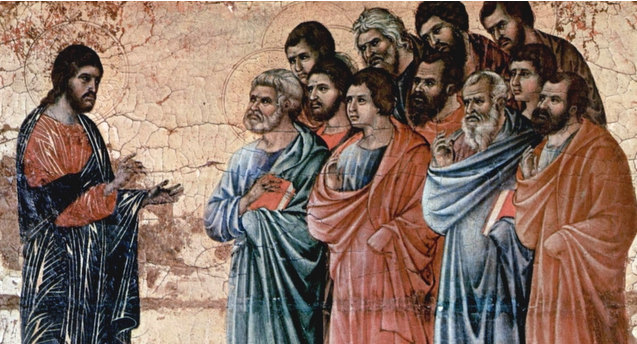Sixth Sunday of Easter

https://tillchrist.wordpress.com/tag/john-14-23-29/
Today’s Reflection
Gospel: Jn 14:23-29
May 22, 2022 | Sunday
Jesus answered him, “If anyone loves me, he will keep my word and my Father will love him; and we will come to him and live with him. But if anyone does not love me, he will not keep my words; and these words that you hear are not mine, but the Father’s who sent me.
I told you all this while I am still with you. From now on the Helper, the Holy Spirit whom the Father will send in my name, will teach you all things, and remind you of all that I have told you.
Peace be with you! My peace I give to you; not as the world gives peace do I give it to you. Do not be troubled! Do not be afraid! You heard me say, ‘I am going away, but I am coming to you.’ If you loved me, you would be glad that I go to the Father, for the Father is greater than I.
I have told you this now before it takes place, so that when it does happen you may believe.
Today’s Reflection:
As the Lord’s impending departure to the Father draws near, his disciples are increasingly becoming anxious and afraid. In the Gospel Reading, he consoles them with the gift of peace: “Peace I leave with you; my peace I give to you.” (v. 27a). A little later, he wishes them peace as they are surely to face persecution in their bearing witness to the Gospel (Jn 16:33). After the resurrection, he greets his terrified and desperate disciples who are huddled in closed doors with peace no less than three times (Jn 20:19, 21, 26).
That the Lord gifts, wishes, and greets his disciples with peace in order to assuage their anxiety, fear, and despair suggests that peace is a potent antidote to negative situations and feelings. In fact, after giving them peace in the Gospel, he exhorts them not to let their hearts be troubled, and not to be afraid (v. 27c).
The Lord speaks here of peace (Greek: εἰρήνη) which is more than an absence of conflict or war. He speaks rather of the Hebraic “shalom” (שלום) which, as suggested by its verbal root “shalam” (שלם), conveys a profound sense of fullness, tranquility and wellbeing both at the personal and societal level. It is noteworthy that the semantic root of shalom (S L M) has the same root as the word “salamat” (S L M). Salamat is the Filipino as well as the Malay equivalent of the expression “thank you”.
Which offers us a helpful way on how to have shalom in our lives. This has to do with cultivating a sense of thankfulness in life. There are many ways in actualizing a sense of gratitude. Habitually thanking those who extend a little favor to us can be of help. Reviewing our daily experiences and thanking the Lord for them before retiring at night is also helpful. And so is truly accepting our past—both our pleasant and painful experiences. We can only learn something from our past. In on way can we change it anymore. Let this famous prayer be ours: “Lord, grant me the serenity to accept the things I cannot change; courage to change the things I can; and wisdom to know the difference.”
Once the sense of gratitude will have become second nature to us, we shall gradually have peace in life. This kind of peace (shalom) is neither shaken by positive or happy moments in life nor by negative or despairing life’s events. This peace—as intimated in the Gospel—can neither be given nor understood by the world, but it can gradually transform the world into the Kingdom of God..
Augustinian Liturgical Calendar
The Feast of Saint Rita of Cascia, Religious is omitted this year. However, for the monasteries of the Augustinian nuns, it may be transferred on May 21 or on May 23. /Vulnerasti, 2022



